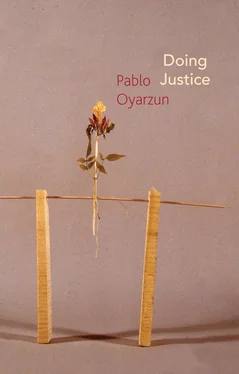Now, to answer to any vocation, it would seem, is to take account of what calls me other than my voice in me—the vocation to be a teacher, the call to become a translator. If it is not to be my whim, then any vocation takes account of what is other than my voice in me. But how will I know that my vocation is not just whim, or fancy? What I called “my voice in me,” my conscience or my desire inasmuch as these are subjective expressions, speaks to me now; but whatever it is that rhymes with it speaks out of that time, in a different tense. When I act on my desire but in time to the time of the vocation of the other in me, I’m bringing my now into rhyme, rhythmically, with a different time. I fancy now, but my vocation proves itself in the event; its tense is perfective.
This, I think, is generally true, whether I’m attending to the call of justice or to that of a profession—the call to nurse, to care, to be a payer of attention, to teach, to tell stories, what have you. But the vocation of justice is also of a different order again: it is not a type of taking account of what is other in me; the vocation of justice is not a profession among others except in the sense that to be called into justice and to respond is to profess.
Rather, justice is this taking account of what is other than me in me: it is the structure of all and any vocation. Justice is responsible to what is perfectly expressed now, my desire, and to what remains perfective.
To ask how justice is to be done now, today, in desperate urgency, when we are threatened by the “devastation” of experience, is to ask how we take account of what is other than ourselves in ourselves: so Benjamin says, as Pablo Oyarzun explains. “But with this devastation something that belongs to the core of experience itself seems to get irremissibly lost.” And now, faced with this “devastation,” “artisanal storytelling continues to protect [the vocation of justice] like a dear treasure.” This “vocation,” Oyarzun’s Benjamin says, “is not substantive in itself but has the subtlety of a disposition, of fortitude and care, of attentiveness ( Aufmerksamkeit )” (p. 76).
“Narration and Justice.” Perhaps this would be a way into (an Introduction to) a response to Doing Justice —the acknowledgment or the hypothesis of a special relation between the demand for justice, the demand that justice be done, and timeliness. By “timeliness” I would be designating something about the nature of the demand for justice: it is of a time; it requires something of us in time, on time. The demand is articulated in the present tense: we demand action on climate justice right now , in the name of the future (in this case), or in the name of damage done in the past (reparations). The demand, though, is paradoxical in at least this sense—that whatever we do or imagine doing in response to the demand for justice is not held to what justice is now, when it is demanded of us or when we demand it of another or of ourselves; now, when we can articulate what we believe is just just now; now, when we are doing justice by doing what we represent to ourselves as just. Instead, whatever we are doing when we are doing justice to the demand is held to the standard of what justice will have been just now. A different tense makes itself felt just here. Once upon a time, I say, “A different tense makes itself felt,” or “Once upon a time, a different tense will have made itself felt.” I might say that the storyteller tells the story of the perpetual battle between these different tenses, and that the storyteller’s story is just, or does justice, to the degree that no tense triumphs, or becomes the story’s protagonist.
This is all rather allegorical, so let me be clearer as I move to close.
Recall the questions that lie behind Pablo Oyarzun’s title, the questions of what it means to “do justice” and to “demand justice.” “Doing justice” translates the expression hacer justicia , which in Castilian or Chilean Spanish is an infinitive expression: “to do justice.” In Spanish the infinitive lends itself to substantivization more easily than the English does—we say el hacer justicia , “the doing justice” or “the to do justice”—and can make that noun the subject of a clause like es imposible el hacer justicia , “the doing of justice is impossible,” which can be shorn of the pronoun to leave es imposible hacer justicia , a common nominal clause.
Of the philosophically non-trivial differences between the verbs hacer and “to do” remark just these two.
We say hacer in Spanish when we speak of making something—its etymology links it to the Latin facere , to produce, create, fabricate. The relation between facere and what is made, factum , and what is fabricated, fictio (< fingere ), is well enough known—“fact” and “fiction,” hecho and hechura , this last the Castilian version of poiema , a “fashioning”; for example, man is God’s poem in Ephesians 2:10. Is justice, then, something hecho , something that is made, fashioned? Is justice a fashioning, a construction—contingent, made out of this or that material in someone’s hands at this moment, and out of something different, in another’s hands at another moment? Is justice different as it travels from hand to hand, or as the word travels from mouth to mouth, from one storyteller’s mouth to another’s? Is justice thus something that can be un fashioned, something of the order of the deconstructible? If justice can be hecha , it can be deshecha , when for instance un desfacedor de agravios like don Quixote is asked to undo an injustice that had appeared to some, at some time, to be justice. We are accustomed to granting that law is made or fabricated; about justice, though, the stories we tell are mixed. Justice is divine, a deity; it is irreducible and undeconstructible; it is the condition on which the law stands and the standard to which laws are held. A law can be unjust—and we will petition for redress, seek to change it, or seek to pass another, a just law. To refuse to obey an unjust law, though, puts us into contravention, not just of a law, but of justice—and this, at least, Socrates will not do. Are we ready to characterize this solemn principle as a fabrication ? Even, tendentially, as fiction ?
Note also this.
Hacer , I said, is infinitive. “Doing” justice, in English, speaks to us of dynamics in the present, of a present progressiveness: it is what we are, or should be, doing. Justice, as Pablo Oyarzun showed us, is not done; maybe justice is never done; it is imperfective, imperfectible. But the expression “doing justice” exists notwithstanding—we understand, roughly, imperfectly, what it means now, or what it is meaning. It is in the doing of justice that justice is poorly, unjustly imagined, or named, or presented. Let’s flip the poor phrase: justice is presented in doing justice. We should maybe even intensify the paradox: justice is just what is presented in doing justice. When we lose the passive we are almost in the familiar, cold grip of tautology: we do justice when we do justice. Doing justice regarding this or that circumstance also does the “justice” to which our doing justice will then refer. It also “does” the work of making that to which the word “justice” will refer.
When we ask what it means to do justice , we immediately ask after the matter of tense: doing justice does what we will refer to when we say that we are doing, will be doing, or have done justice.
Читать дальше




![Гэри Бишоп - Stop doing that sh*t. Прекрати самосаботаж и начни жить по максимуму [litres]](/books/389005/geri-bishop-stop-doing-that-sh-t-prekrati-samosabo-thumb.webp)







